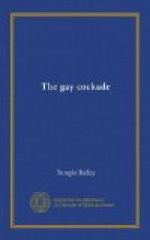Then when the great moderns confronted us—Sorolla and the rest—Perry complained, “Why did I study law, Roger, when I might be doing things like this?”
“It is not too late,” I told him.
I felt that he must not be curbed, that his impassioned interest might blossom and bloom into genius if it were given a proper outlet.
So it came about that he decided to paint. He would stay in Paris a year or two in a studio, and test his talent.
But his people would not hear of it. There had been lawyers in his family for generations. Since the Civil War they had followed more or less successful careers. Perry’s own father had made no money, but Perry’s mother was obsessed by the idea that the fortunes of the family were bound up in her son’s continuance of his father’s practice.
So Perry went home and opened an office. His heart was not in it, but he made enough to live on, and at last he made money enough to marry a wife. He would have married her whether he had enough to live on or not. She was an artist, and she was twenty when Perry met her. We had been spending a month in Maine, on an island as charming as it was cheap. Rosalie was there with a great-aunt and uncle. She was painting the sea on the day that Perry first saw her, and she wore a jade-green smock. Her hair was red, drawn back rather tightly from her forehead, but breaking into waves over her ears. With the red of her cheeks and the red of her lips she had something of the look of Lorenzo Lotto’s lovely ladies, except for a certain sharp slenderness, a slenderness which came, I was to learn later, from an utter indifference to the claims of appetite. She was one of those who sell bread to buy hyacinths.
I speak of this here because Rosalie’s almost ascetic indifference to material matters, in direct contrast to Perry’s vivid enjoyment of the good things of life, came to have a tragic significance in later days. Perry loved a warm hearth in winter, a cool porch in summer. He had the Southerner’s epicurean appreciation of the fine art of feasting. The groaning board had been his inheritance from a rollicking, rackety set of English ancestors, to whom dining was a rather splendid ceremony. On his mother’s table had been fish and game from Chesapeake, fruits and vegetables in season and out—roast lamb when prices soared high in the spring, strawberries as soon as they came up from Florida. There had always been money for these in the Cunningham exchequer, when there had been money for nothing else.
Rosalie, on the other hand, ate an orange in the morning, a square of toast at noon, a chop and perhaps a salad for dinner. One felt that she might have fared equally well on dew and nectar. She had absolutely no interest in what was set before her, and after she married Perry this attitude of mind remained unchanged.
She was a wretched cook, and made no effort to acquire expertness. She and Perry lived in a small but well-built bungalow some miles out from town, and they could not afford a maid. When I dined with them I made up afterward for the deficiencies of their menu by a square meal at the club. There was no chance for Perry to make up, and I wondered as the years went on how he stood it.




